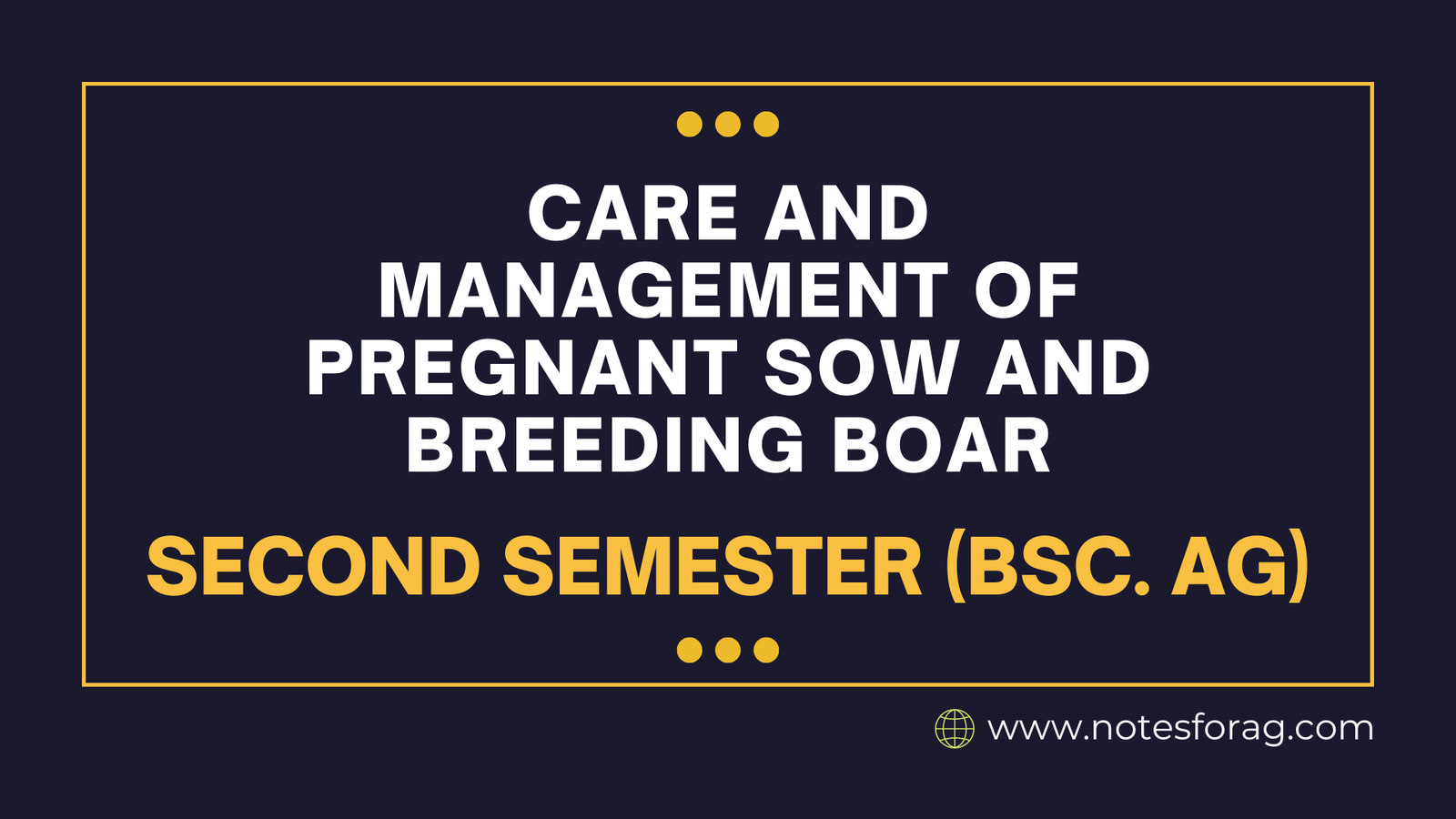Pregnant sow and breeding boar require special care and supervision to ensure successful reproduction and the health of both pregnant sow and breeding boar the animals and their offspring. Pregnant sows require sufficient feed, pleasant housing, and regular health monitoring to help them through their pregnancy and prepare for farrowing. To preserve fertility and overall health, breeding boars require a well-balanced diet, adequate activity, and careful handling. Effective management approaches promote reproductive performance, litter outcomes, and the breeding stock’s long-term health and productivity.
Table of Contents
Pregnant Sow and Breeding Boar
Caring for and managing pregnant sow and breeding boar requires attention to their nutrition, housing, health, and overall well-being. Here are some detailed guidelines for both pregnant sow and breeding boar:
Pregnant Sow Management
Pregnant sow management entails providing adequate feeding, shelter, and healthcare to ensure the sow’s health and well-being throughout pregnancy. This includes eating a nutritiously balanced meal, keeping a clean and comfortable environment, routinely assessing health, and effectively preparing for farrowing. Good management practices strive to reduce stress, prevent infections through immunizations and parasite control, and offer proper care before and during childbirth in order to maintain healthy children and maternal health.

1. Nutrition:
- Balanced Diet: To promote embryonic development, provide a diet high in calories, protein, vitamins, and minerals.
- Feeding schedule: Feed the sows at regular intervals. Overfeeding can cause obesity, while underfeeding can result in poor fetal growth.
- Water: Maintain constant access to clean, fresh water.
2. Housing:
- Comfortable environment: Offer a clean, dry, and comfortable pen. Proper bedding, such as straw or shavings, improves comfort.
- Space: Allow plenty of area for moving. Gestation boxes are controversial owing to animal welfare concerns, therefore think about group housing solutions that allow for social interaction.
- Temperature Control: Maintain a suitable temperature to avoid heat or cold stress.
3. Health:
- Regular Check-Ups: Regularly check the sow’s health for any symptoms of disease or suffering.
- Vaccination: To prevent disease, ensure that the sow has had all necessary immunizations.
- Parasite Control: Regular deworming and parasite control procedures are required.
- Stress Reduction: Reduce tension by handling the sow gently and maintaining a quiet environment.
4. Pre-farrowing Care:
- Farm Land Preparation: Move the sow to a farrowing crate or pen about a week before the scheduled farrowing date.
- Observation: Check for indicators of approaching labor, including as restlessness, nest-building behavior, and milk letdown.
Breeding Boar Management
Breeding boar management focuses on the health, nutrition, and reproductive fitness of boars used for breeding. This includes providing a balanced diet to promote good bodily condition while avoiding excessive weight gain, guaranteeing appropriate space and suitable housing, and periodically checking health through veterinarian check-ups. Proper management procedures aim to improve the boar’s reproductive performance, semen quality, and overall well-being, resulting in successful breeding outcomes.

Nutrition
- Balanced Diet: Provide a diet that meets a boar’s nutritional requirements, including energy, protein, vitamins, and minerals.
- Avoid overfeeding: Control your food intake to avoid obesity.
Housing
- Space: Allow plenty of area for moving. Boars require exercise to keep their muscle tone and reproductive health.
- Bedding: Use appropriate bedding to promote both comfort and hygiene.
- Secure Pen: Make sure the pen is robust and secure to avoid escapes and injury.
Health
- Regular Check-Ups: Regular veterinary examinations are essential for early diagnosis of health problems.
- Vaccination: Keep your vaccines up to date to avoid sickness.
- Parasite Control: Establish a regular parasite control program.
- Hoof Care: Regularly inspect and trim hooves to avoid lameness.
Breeding Management
- Breeding Schedule: Create a breeding schedule to prevent overuse and tiredness. Boars should not be bred too often.
- Observation: Observe mating behavior to guarantee successful reproduction. Ensure that the boar is not unduly aggressive with the sow.
- Semen Quality: To ensure fertility after artificial insemination, examine the semen quality on a regular basis.
Effective care and management of pregnant sow and breeding boar is critical to their health, welfare, and reproductive success. This includes providing sufficient diet, adequate shelter, regular health monitoring, and stress management. Farmers may promote healthy pregnancies, effective breeding, and overall productivity by ensuring optimal conditions and meeting each animal’s individual demands. Implementing these best practices not only improves animal welfare, but also helps to ensure long-term profitability in livestock operations.
Frequently Asked Question(FAQ)
What vaccinations are necessary for pregnant sows and breeding boars?
Vaccination methods vary by region and farm conditions, but they typically include vaccines for swine parvovirus, leptospirosis, erysipelas, and influenza. Consult a veterinarian for a personalized immunization program.
What is the ideal diet for a breeding boar?
A breeding boar’s diet should be well-balanced, containing enough calories, protein, vitamins, and minerals. Avoid overeating to avoid obesity, which might impair reproductive performance.
Related Articles

